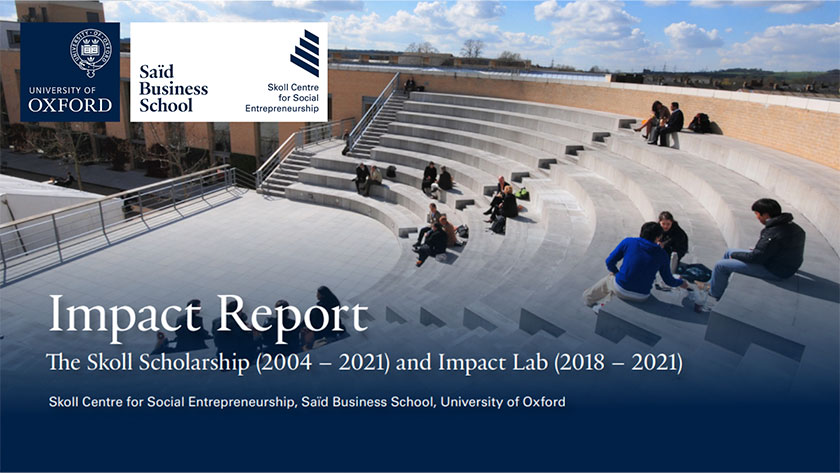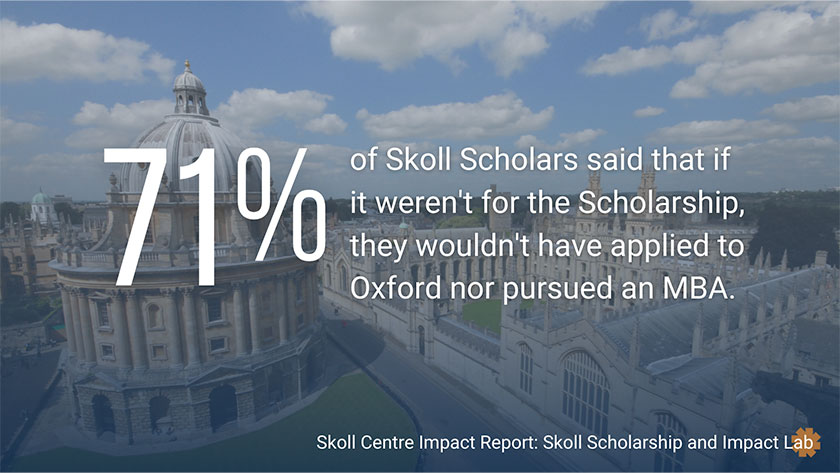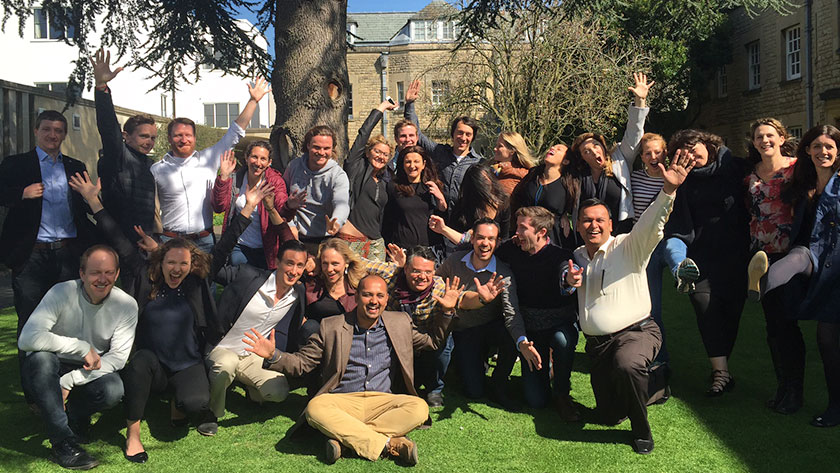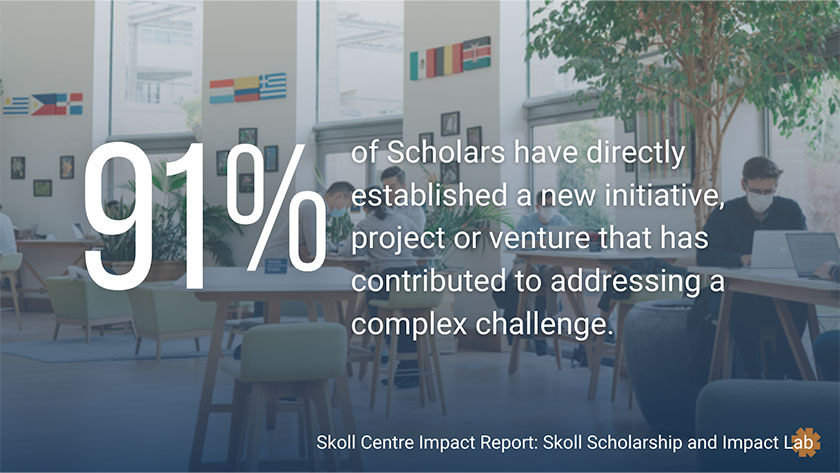As I write, yet another new variant of Sars-CoV-2, Omicron is spreading concern and contagion around the world. Though we don’t yet know the implications of Omicron’s emergence, it’s a wearying reminder that this pandemic is far from over. Of course, Covid-19 has been far more than a public health crisis. The ripple effect of the pandemic, and our uneven response to it, has triggered economic crisis, deepened inequalities, exploited our social fault lines, and left us all exhausted.
But there’s too much at stake for us to relent. In an age of pandemics, microbial and otherwise, there is no going back to the way things were. Covid-19 is a dress rehearsal for 21st century problems. As we build towards a recovery, we need to take bold steps to build a more equitable and more resilient society and a healthier planet. The future of, well, everything depends on it.
Social entrepreneurs have long recognised this. They tackle issues at their root cause. They are in the business of redefining what’s possible. They understand that deep change requires collective action, and that real change comes not from the top down, but from the community outward. Social entrepreneurs were made for this moment.
For nearly two decades the Skoll Centre for Social Entrepreneurship at the University of Oxford has invested in attracting, nurturing, and amplifying the leaders of our future. Since 2004 our Skoll Scholarship has helped more than 80 proven change makers complete the Oxford MBA. Our Scholars have gone on to exceptional accomplishment and have also nurtured a vibrant alumni network that remains the beating heart of the Skoll Centre.
As the Centre and the field of social entrepreneurship grew, increasing numbers of MBA students came to Oxford looking to build the skills needed in tackling social and environmental challenges. We started the Impact Lab in 2018 to meet this growing demand, and to address the shifting skills needed to drive change in an interconnected world. It was also a way for the Centre to reach and influence more talent across the University, not just its Skoll Scholars. The Impact Lab is a co-curricular program to support those Oxford MBA students who are committed to having an impact-driven career. And so fair, including this current term, we have been able to support nearly 130 students in their social impact journey.
Our ambitions are far greater. We’re working to redefine and mainstream social impact education, and do so equitably. And we wanted to start by looking back, to understanding how both the Scholarship and Impact Lab have impacted the personal and career trajectories of our alumni. So earlier this year, we commissioned Openwell to perform an in-depth impact study. Attributing impact is challenging under the best of circumstances, and we knew that evaluating the long-term impact of an educational program would have its limitations. But how can we teach our students about impact evaluation and walk the talk? The true goal of this assessment was to learn, share, and continuously improve.
So, what did we find? After more than 70 pages, countless spreadsheets of data and 9 in-depth case studies we were able to draw a pretty good picture of how these programs have shaped the community’s careers. We were able to work this into a more succinct impact study report which I am delighted to be able to share with you all. You can find the full report here.
The value of having a fully funded scholarship to one of the most prestigious Universities in the world means that we can bring people from all over the world who otherwise might not be able to afford the costs. Freeing social change leaders from debt means they are better able to concentrate on working towards their purpose and mission. 71 percent of our Scholar alumni agreed that they would not have been able to pursue an MBA if had not been for the Skoll Scholarship.

As well as providing the financial benefit for a lucky few, the presence of the Skoll Centre at Oxford was seen to provide additional credibility to the social impact focus of the Oxford MBA and Saïd Business School. In the study, alumni said that they also applied to the MBA and the Skoll Scholarship because they saw it was the best opportunity to:
As documented in the study, the Skoll community, including convenings such as the Skoll World Forum and the Skoll Scholar Summit continues to play a nurturing role for the alumni community. It provides access to personal support, knowledge, resources, and encouraging collective responsibility and motivation for social impact. Skoll Scholars also reported using the network to access capital, find business partners, and recruit staff.

Jesse Moore (Skoll Scholar and MBA 2006) is the CEO and co-founder of M-KOPA Solar, a pay-as-you-go energy company for off-grid customers in East Africa. M-KOPA has been supported by the Skoll Centre and its alumni network since the very beginning. With many alumni both from the Skoll Scholarship and the wider Oxford MBA community choosing to work for them, helping to increase its expansion across Sub-Saharan Africa. You can read more about this on page 15 of our report.
We found that an amazing 100 percent of Skoll Scholars agreed they made connections with people they wouldn’t have otherwise been able to make if it weren’t for coming to Oxford. I can testify that Oxford is truly a melting pot of brilliant thinkers and incredible people working towards making the world a better place. And let’s not deny, having Oxford on your resume certainly holds some clout when setting up meetings with potential funders or partners. Again, a fantastic 91 percent of Skoll Scholars directly established a new initiative, project or venture that has contributed to addressing a complex challenge because of studying at Oxford.

So, what happens when our incredible alumni go off into world after their time with us? Well, what our study showed is that our alumni across both programs are working to address all 17 Sustainable Development Goals, with many of them working across more than one. For the Impact Lab, a program we started to nurture the talent pool of the MBA, 71 percent of alumni reported that the Lab had increased their confidence to pursue impact careers and 83% said they felt more confident in becoming impact leaders.
Our study also sought to find out how the programs had not just affected the careers of the alumni, but also how the learnings from activities in the programs spread out into the world. This idea of transferring knowledge was captured across four channels: within organizations, between organizations, publicly, and between people. More than two-thirds of alumni said they had transferred soft skills such as empathy, understanding power and privilege, self-reflection, and social purpose onto others. I truly believe that these skills are essential for effective systems leadership. The study found that more than two-thirds of alumni had also shared skills such as analytical and critical thinking, storytelling, impact measurement, and systems thinking.
We’ve already incorporated several lessons learned from this report into our plans for the 2021/22 academic year. For example, we will be engaging with our Oxford faculty colleagues in a broad review of the Impact Lab curriculum, aiming for a rigorous and differentiated approach that will keep us on the leading edge of impact education. Like our well-established, vibrant, and strong Skoll Scholar alumni community, we’ll work to grow this network with our Impact Lab graduates also.
We will also be making solid efforts to widening access. Knowledge Equity – the elevation of lived and practiced experience, along with learned expertise – has become a core pillar of the Centre’s work. We believe that diversity, conceived broadly, is a both a moral imperative and key to innovation. We have embedded a Knowledge Equity approach into our Skoll Scholar recruitment pipeline, targeting high-potential individuals from diverse, underrepresented, and disadvantaged backgrounds both globally and close to home.
The insights from this impact study are extremely heartening and reinforce the Skoll Centre’s core mission. It is the rich Skoll Scholar and Impact Lab alumni community who will help mend and transform these fractured fault lines.
Read the full impact study report https://www.sbs.ox.ac.uk/sites/default/files/2021-09/Impact-Report_Skoll-Scholarship-Impact-Lab-2021.pdf
banner image: Libby McCarthy, 2020-21 Skoll Scholar, working on an Ag Tech project in Myanmar